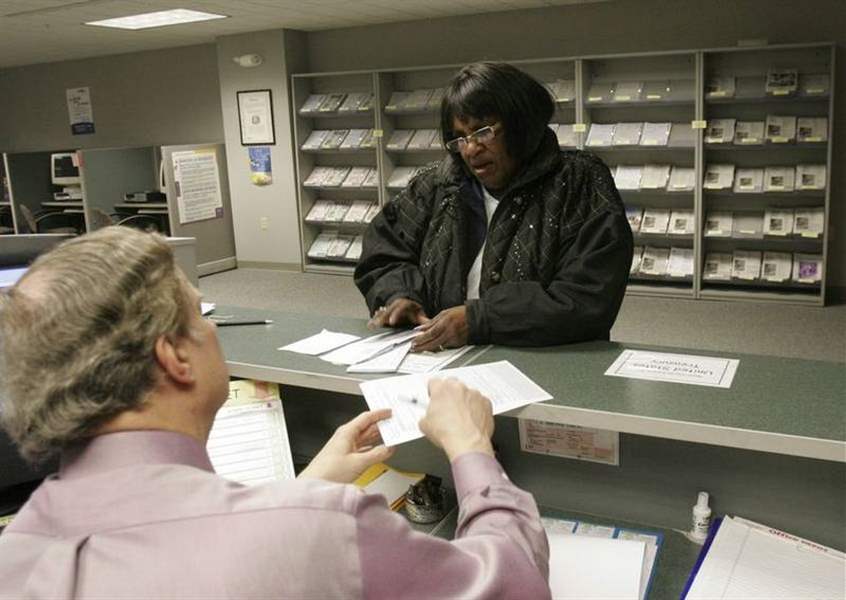
Filing tax returns crucial; rebates won't go out unless forms come in
2/24/2008
Tom Hojnacki handles questions from taxpayer Virgaie Washington at the IRS offices in downtown Toledo.

Tom Hojnacki handles questions from taxpayer Virgaie Washington at the IRS offices in downtown Toledo.
STATE LOTTERIES officials like to say that you can t win if you don t play.
In that spirit, the Internal Revenue Service wants people to know that they won t get a highly publicized economic stimulus rebate check of up to $600 if they don t file a tax return this season.
That could be a surprise to many seniors, veterans, or low-income adults accustomed to not filing because their incomes are largely tax exempt.

In January, before this was announced, we told a lot of people who asked us if they needed to file that they didn t have to file, said Nancy White, co-owner of All Pro Tax and Accounting Services Inc. in Toledo.
Since the economic stimulus package was announced, we ve been trying to contact those people and let them know they need to come in.
Local tax preparers and accountants said this is a good year for the additional filers because changes to the federal tax code for 2007 were small or relatively obscure. The federal filing deadline is April 15.
Most of the changes were in the ceilings and floors on some things, but there was nothing major where you say, Man, that was a big issue, said Euland Tucker, of Tucker, Kissling, and Associates Inc., in Oregon.
Taxpayers will find that a lot of the numbers have changed, but the underlying principles haven t, said accountant Jeff Ogg, of Jeffrey P. Ogg CPA Ltd., of Toledo.
For example, a lot of wealthier taxpayers were concerned about the alternative minimum tax, which 4 million taxpayers faced last year. Congress late last year raised the amount of income exempt from the tax, decreasing the number of people who will have to pay it.
I had a client who would have had to pay the AMT had they not raised the limit, Mr. Tucker said. It was going to cost him $400 or $500 more in taxes.
The new exemption limits for the AMT are $44,350 (up from $42,500) for singles or heads of households; $33,125 (up from $31,275) for those married but filing separately, and $66,250 (up from $62,550) for 2007 joint filers.
The IRS expects 145 million tax filers this year, or an increase of 3 percent from a year ago. About 80 million taxpayers filed returns electronically last year, a figure that has risen for the past few years. About 57 million people used tax preparers last year.
In all, 106 million got refunds, averaging $2,324.
A big influx of tax filings is expected this year nationally because of the rebate checks, and the IRS is prepared.
We re expecting millions of additional people to be filing, said Eric Erickson, an IRS spokesman. The AARP, a retiree lobbying group, estimates up to 20 million more taxpayers will file to get rebate checks.
To qualify, a resident must have at least $3,000 in earned income, Social Security, veteran s benefits, or other federal retirement benefits. Students claimed as dependents by their parents are ineligible.
The checks, to be mailed out only to tax filers starting in May, will be up to $600 for individuals, $1,200 for couples, and an additional $300 for dependent children under age 17 last year.
Other changes in the federal tax filing process include a higher limit on tax-deferred individual retirement accounts. People age 50 and over can now invest up to $5,000 each, instead of $4,000, in an IRA.
The standard deduction has increased for 2007 to $5,350 for single taxpayers, $7,850 for heads of households, and $10,700 for married taxpayers filing jointly.
It had been $5,150 for single taxpayers, $7,550 for heads of households, and $10,300 for married couples.
There is good news for home-owners who struggled with debt or mortgages in 2007. Those whose mortgage debt was partially or entirely forgiven may be able to claim special tax relief by filling out Form 982.
Previously, debt forgiveness was considered taxable income, but a Mortgage Forgiveness Debt Relief Act allows homeowners to exclude debt that was forgiven on their principal residence if the balance of the loan is less than $2 million.
One key filing measure pushed by local groups is the earned income credit, which has higher income limits this year.
The credit allows low-income earners and families earning less than a set amount to get a bigger tax credit. If the earned income credit exceeds the amount of taxes owed, it results in a tax refund to those who qualify for it using Forms 1040 and 1040A.
People giving charitable donations won t get additional breaks this year, but they will have more paperwork. The IRS requires charitable donations claims be accompanied by a receipt or canceled check from the recipient listing the amount of the donation.
Now you ve got to have proof for everything, Mr. Tucker said.
However, fewer than 20 percent of tax returns are audited, and among returns in the lower tax brackets the proportion is even lower, so it is unlikely that someone with only a few charitable donations will be called to provide paperwork.
Still, from now on, If someone gets an audit, there ll be a problem if they don t have their receipts, Mr. Tucker added.
Contact Jon Chavez at: jchavez@theblade.com or 419-724-6128.